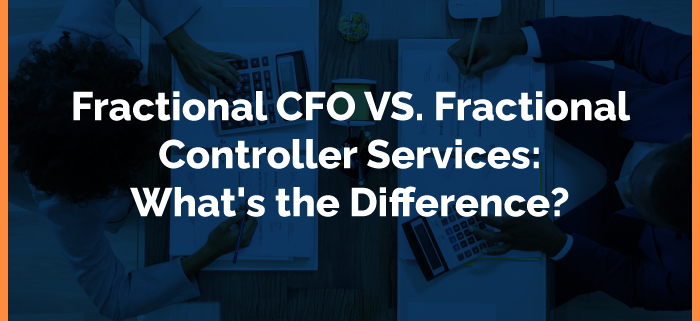Fractional CFO VS. Fractional Controller Services: What’s the Difference?
Imagine running a thriving business but finding yourself buried under financial strategies and complex management reports.
With expanding operational demands, these aspects can often fall by the wayside.
Here’s where the value of fractional CFOs and controllers comes in.
They are crucial in managing financial operations without committing to a full-time position.
But what exactly are these roles, and more importantly, what are the key differences?
In this article, we explore the nuances between a fractional CFO vs. a fractional controller and why understanding these distinctions is critical to your business.
Understanding the Role of a Fractional CFO
A Fractional CFO, or Chief Financial Officer, is a high-level financial professional who offers services to businesses part-time or contract. The term ‘fractional’ refers to the part-time nature of their role.
They typically service several businesses simultaneously.
One of the primary roles of a fractional CFO is to bring strategic financial leadership to a business.
They look at the big picture, analyze financial data, and make strategic recommendations to help the business grow and prosper.
A fractional CFO is often a valuable asset for a company that’s scaling rapidly or undergoing financial challenges.
They perform tasks such as:
- Financial forecasting
- Managing cash flow
- Negotiating with lenders
- Providing in-depth financial analysis
These duties assist businesses in navigating complex financial landscapes and help them make more informed decisions.
When a business hires a fractional CFO, they gain access to high-level financial expertise without the full-time executive price tag.
It’s a cost-effective solution for small to medium-sized businesses or startups that require financial guidance but may not have the resources to hire a full-time CFO.
Exploring the Role of a Fractional Controller
A fractional controller has a more hands-on role. Like a fractional CFO, a fractional controller works part-time or on a contract.
They offer high-level accounting help without being there all the time.
A fractional controller’s role primarily involves managing the accounting operations of a business.
Their responsibilities include:
- Overseeing the company’s accounting staff
- Ensuring that accounting processes are efficient
- Producing accurate financial statements
They handle tasks such as regulatory compliance, month-end closing, and creating internal controls for fraud prevention.
To put it simply:
- A fractional CFO focuses on strategic financial planning
- A fractional controller focuses on the day-to-day details of a company’s accounting operations
Like hiring a fractional CFO, hiring a fractional controller is a good choice for some businesses.
They get the expertise they need without hiring a full-time person.
This can be helpful for companies that need accounting help but aren’t ready to hire a full-time controller.
Fractional CFO vs. Fractional Controller: The Key Differences
When comparing a fractional CFO vs. a fractional controller, the differences lie primarily in their focus and responsibilities.
A fractional CFO tends to take on a more strategic role.
They work with a company’s top leadership to look forward and strategize.
A fractional CFO uses financial data to create business plans and decisions.
They work on the following:
- Financial forecasts
- Cash flow management
- Dealings with lenders
On the other hand, a fractional controller is involved in the nitty-gritty of a company’s daily accounting operations.
Their tasks involve:
- Ensuring the smooth running of accounting processes
- Compliance with financial regulations
- Accuracy of financial statements
They are the overseers of the accounting staff and guarantee that the work is precise and in line with standards.
Another key difference is in their relationships with the company’s other staff.
The CFO is a part of the company’s leadership team; They often work closely with the CEO.
The controller, however, is more likely to interact with the accounting and finance staff daily.
Why Choose One Over the Other?
Hiring a fractional CFO or a fractional controller depends on a company’s specific needs.
A fractional CFO might be the best fit if your company:
- Is facing rapid growth
- Is dealing with cash flow challenges
- Needs help with strategic financial planning
They can provide the high-level financial expertise and strategic planning necessary for growth and financial stability.
On the other hand, a fractional controller would be more suitable if a company’s needs are more tactical and involve the daily management of its accounting operations.
They can help in:
- Managing and optimizing the company’s accounting processes
- Ensuring regulatory compliance
- Preventing potential accounting issues
But it’s not always an either-or situation. Some companies might benefit from having both.
A fractional CFO and controller can work together, the controller can manage the day-to-day accounting operations, and the CFO uses this information to make strategic financial decisions.
This tandem can create a powerful, cost-effective financial management team for companies not yet ready to hire full-time executives.
Choosing the Right Service for Your Business
Picking between a fractional CFO and a fractional controller can seem tricky, but understanding your business’s needs can make the choice clearer.
Think about your company’s current situation:
- Is your business growing fast?
- Are you having cash flow issues?
- Do you need someone to plan for the future and make strategies?
If so, a fractional CFO might be the best fit.
Are your daily accounting tasks piling up, and keeping track is getting hard? It might be time to bring in a fractional controller.
They can manage your accounting processes and ensure everything is running smoothly.
Consider also the cost, and fractional services might seem expensive at first.
But when you consider the value they bring, it could be a smart move.
You get high-level expertise without the cost of a full-time position.
Unraveling the Complexity: Your CFO and Controller Solutions
Understanding the difference between a Fractional CFO vs. Fractional Controller is pivotal in complex financial operations.
These roles are key drivers of growth and efficiency, and while their responsibilities may overlap, their unique contributions shouldn’t be overlooked.
With over 25 years of expertise, Master Accounting and Tax Service, provides top-tier fractional CFO and controller services.
We invite you to experience our secure, encrypted online capabilities, making your interactions with us convenient and efficient.
Ready to unlock your business’s financial potential? Contact us today.
Ready to unlock the full potential of your business’s financial operations and tired of endlessly searching controller services near me on Google? Look no further! At Master Accounting and Tax Service (MATS), we specialize in providing top-tier accounting, tax, bookkeeping, and fractional CFO / controller services at an affordable cost and with the utmost integrity. Call (480) 456-4999 or Contact us today!
Keep Reading:
The Vital Role of a Fractional Controller: Key Responsibilities and Benefits
Time-Saving Benefits of Outsourced Bookkeeping to Maximize Productivity
How Phoenix Accounting Services Can Help You Plan for the Future












